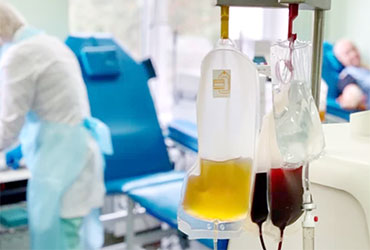By Ethan Covey
Clinical practice guidelines issued by the Association for the Advancement of Blood and Biotherapies (AABB) recommend the use of COVID-19 convalescent plasma (CCP) for outpatients at high risk for disease progression, hospitalized patients who are immunosuppressed, and hospitalized patients who do not have SARS-CoV-2 antibodies.
The guidelines reflect learnings from many trials that studied the use of CCP (Ann Intern Med 2022 Aug 16. doi:10.7326/M22-1079).

“The use of CCP has been widespread, but also controversial,” said Aaron Tobian, MD, PhD, a professor of pathology, medicine and epidemiology at Johns Hopkins University, in Baltimore.
“Early in the pandemic, data on CCP efficacy and which patient populations would benefit most was highly limited. Now more than 30 randomized trials have been published,” he added.
Data from 33 randomized controlled trials assessing 21,916 participants from January 2019 through January 2022 were reviewed to inform the guidelines, and the results were summarized using the Grading of Recommendations Assessment, Development and Evaluation (or GRADE) method.
For outpatients, the AABB suggested the use of CCP along with other standard treatments, for patients who are determined to be at high risk for disease progression. For inpatients, the AABB recommended against CCP transfusion for unselected hospitalized individuals with moderate or severe disease. However, use of CCP is recommended for inpatients who do not have SARS-CoV-2 antibodies detected at admission or have preexisting immunosuppression.
The new guidelines do not support the use of CCP as prophylaxis for uninfected people with close-contact exposure to a person with COVID-19.
“Overall, CCP is most effective when the units contain high neutralizing antibodies and also transfused early after SARS-CoV-2 infection,” Dr. Tobian explained.
“These guidelines may also be useful in guiding treatment options in the future—for COVID-19 or other potential emerging infectious diseases,” he noted. “Convalescent plasma is relatively easy to obtain and often one of the first therapeutics available for emerging infections.”
Dr. Tobian said the key principles provided in the AABB guidelines will be important steps to incorporate into practice during the current evolving pandemic as well as future epidemics.
“As the COVID-19 pandemic continues and new variants of concern emerge, it is important to make sure all potential therapeutic options are available, especially for some of the most vulnerable patient populations,” Dr. Tobian concluded.
{RELATED-HORIZONTAL}